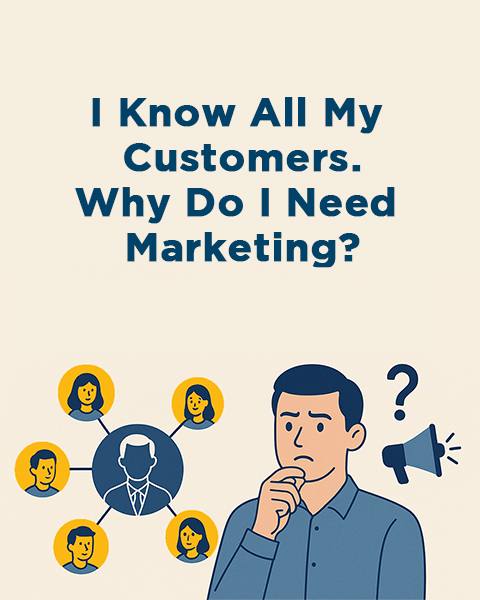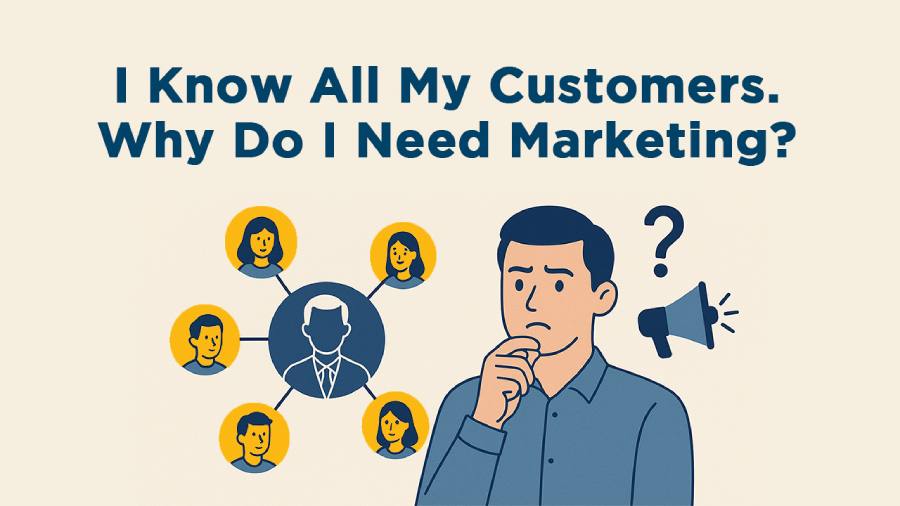


A few years ago, I was sitting in a sleek conference room across from the CEO of a thriving B2B company. He was confident, self-assured, and a leader in his industry. As we talked about his business, he casually mentioned, “I know all my customers. Why do I need marketing?”
I leaned back in my chair, nodded, and thought for a moment. Hmm, that’s a good point. After all, this CEO clearly had a tight grasp on his existing clientele — he knew their needs, their pain points, and their preferences. But then, I asked myself a simple question: Is that enough?
I replied, “Well, I guess it depends. Assuming you don’t want more clients...”
At first, there was silence. Then, he chuckled.
This CEO had been running his business for years. His customers were loyal, his reputation was solid, and things were humming along just fine. But as we dove deeper into the conversation, it became clear: He was playing it safe. He had built a great company, but he was assuming that the existing network would carry him forward.
But let me ask you this: Can you afford to keep things as they are forever?
It’s easy to get comfortable when you know your clients. You know the pain points they face. You understand their needs and their buying patterns. You’re comfortable with your network and the relationships you’ve built. Everything is steady — and in the business world, stability is nice.
But the question I had for this CEO was simple: What if your customers start looking elsewhere?
What if the business landscape changes? What if new competitors emerge offering something fresh or innovative? What if your clients’ needs evolve, but you’re not in a position to meet them because your focus has only been on those who already know you?
Marketing isn’t just about attracting new clients; it’s about ensuring that you remain top of mind — that you’re constantly adapting to the changing market. It’s about extending your reach, exploring new opportunities, and protecting your business from complacency.
Even if you know every customer, how much do you know about the next group of customers? The ones you haven’t met yet, who will keep your business growing?.
I told the CEO, “You may know all your clients now, but how will you reach the ones you don’t know yet? And what happens when your current clients decide they need something new?”
The reality is that your market is always evolving. New challenges arise, customer needs shift, and new competitors crop up — and it’s your ability to adapt that will determine whether your business thrives or merely survives.
For every real estate developer, the goal isn’t just traffic—it’s qualified leads. That’s where SEO wins.
Here’s the thing: Marketing isn’t just for businesses that are looking for growth. It’s also for businesses that want to stay relevant and keep their existing clients engaged. In fact, marketing allows you to do all of that:
In short, marketing is the tool that keeps you in the conversation — and in the game.
I asked that CEO, What would happen if your customers went elsewhere? What would happen if your competitors made a better offer or if your customers no longer saw you as the best choice?
That’s when he paused.
You see, it’s easy to think that if you’re doing well today, you’ll be doing well tomorrow. But that’s not always the case. In today’s fast-paced business world, nothing stays the same for long. Companies that don’t evolve with the market get left behind.
Marketing matters because it helps you stay relevant. It helps you learn about emerging trends. It helps you attract new clients, but it also keeps your existing clients engaged. Marketing is not just about "selling"—it’s about telling your story, building relationships, and staying visible in a world that’s constantly changing.
And just in case you’re wondering: Yes, you can afford to keep your business as it is — but only for so long. Eventually, the world will catch up, and the
So, next time someone says, “I know all my customers,” you can smile and say, “That’s great! But what about the ones you haven’t met yet?”